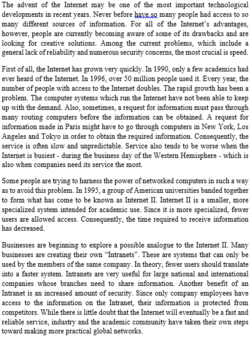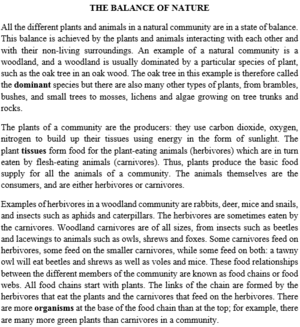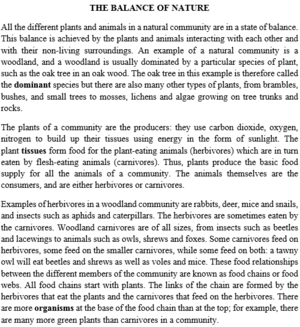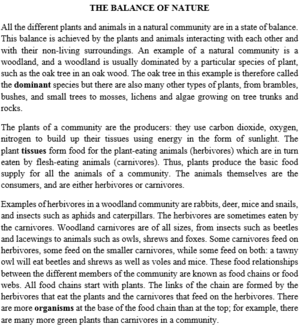Read the following passage and mark the letter A, B, C or D to indicate the correct answer to each of the questions
A : Modern life is impossible without travelling. The fastest way of travelling is by air. With a modern airliner you can travel in one day to places which it took a month or more to get to a hundred years ago.
Travelling by train is slower than by air, but it has its advantages. You can see the country you are travelling through. Modern trains have comfortable seats and dining cars. Theymake even the longest journey enjoyable.
Some people prefer to travel by sea when it is possible. There are large liners and river boats. You can visit many other countries and different places. Travelling by sea is a very pleasant way to spend a holiday.
Many people like to travel by car. You can make your own timetable. You can travel three or four hundred miles or only fifty or one hundred miles a day, just as you like. You can stop wherever you wish - where there is something interesting to see, at a good restaurant where you can enjoy a good meal, or at a hotel to spend the night. That is why travelling by car is popular for pleasure trips, while people usually take a train or a plane when they are travelling on business.
1. From the passage we know the fastest way of travelling is _______.
A. by car B. by train C. by air D. by sea
2. If we travel by car, we can _______.
A. make the longest journey enjoyable
B. make our own timetable
C. travel to a very far place in several minutes
D. travel only fifty or one hundred miles a day
3. The underlined word "They" in the passage refers to _______.
A. modern trains in the country
B. the travellers on the modern trains
C. the slower ways of travelling
D. comfortable seats and dining cars
4. When people travel on business, they usually take _______.
A. a train or a plane B. a boat or a train
C. a plane or a car D. a car or a boat
5 How many ways of travelling are mentioned in the passage?
A. three B. four C. five D. six
B : Helen Keller was a very bright and beautiful girl. At the age of six months she could already say a few words. But before she was two years old, she was badly ill. She could not see or hear, and soon she could not even talk. Since then Helen had to fight for what she wanted.
When she was six, her parents invited a teacher for her. With the help of the teacher, she began to see and hear the world around her through her hands. She learned to read the books for the blind. The teacher took Helen for long walks, and told her about all the beautiful sights. Helen touched flowers, climbed trees and smelt a storm before it came. She also learned how to swim and ride a horse.
After she grew up, she became a famous writer in America. Her first and most famous book is The Story of My Life. Her story brought new hope to many blind and deaf people. It gave light to those in darkness and encouraged them to live and work.
1. When could Helen Keller already say a few words?
A. at the age of two B. at the age of a year and a half
C. at the age of six months D. when she was six years old
2. Why couldn’t Helen see or hear later?
A. Helen was badly ill. B. She had a traffic accident.
C. Helen was very tired. D. She became very lazy.
3. How could Helen begin to see and hear the world around her?
A. with the help of her father B. through her feet
C. with the help of her parents D. with the help of her teacher
4. After Helen grew up, she became a famous _______.
A. doctor B. scientist C. singer D. writer
5. What gave light to those in darkness and encouraged them to live and work?
A. their teacher’s help B. Helen’s story
C. their parents’ help D. Helen’s songs
Read the following passage and mark the letter A, B, C or D to indicate the correct answer to each of the questions ..
A: Last summer Nam, my old classmate, decided to do a three-week course in Australia because he wanted (1) ________ his English. On his first day at the language school, they (2) ____________ him a test, and the teacher told him, “We’ll put you in the top class.” He was very (3) ____________ to hear that, and, “I am sorry to say”, he proudly to tell all his friends at home, “I’m one of the best students!” But soon he was surprised to find
(4) _____________ difficult the class was. He was also felt homesick. “It’s hard to adapt to life in another country!” he thought. (5) ____________ the end of the three weeks, his English was much better, but he was happy to return home.
1. | A.improved B.improving C.to improve D.improve |
2. | A.brought B.carried C.receive D.gave |
3. | A.pleased B.pleasing C.pleasant D.pleasure |
4. | A.what B.how C.which D.why |
5 | A.At B.In C.By D.On |
B : When I finished school in Germany last year, I did not know what to do next. I wanted to travel, but for that you need money. That means having a job, and without having a university degree, it is difficult to get a good one. My parents agreed I could put off (1)……………a decision about a university course for a year. Then a family in London invited me to live with them, help look (2)…………… the children and do a little housework in return for some pocket money. I (3)……..….. with this family for five months now. My main job is to meet the three children from school, give them their supper and help them with their homework (4)………… their parents come home at about six. Sometimes I must stay in with the children in the evening. I go to English classes three times a week, and at weekends I visit different parts of Britain. Although my parents are happy that I am studying a foreign language while I enjoy this chance to see more of the world, they keep (5)………… me what I want to study at university. I still cannot make up my mind!
1 | A.doing B.making C.creating D.getting |
2. | A.afterB.of C.for D.at |
3. | A.was living B.had livedC.lived D.have been living |
4. | A.until B.whenever C.whenD.to when |
5. | A.to ask B.to askingC.ask D.asking |
C. Hi. We are from Neptune, the eighth planet from the Sun in the Solar System. Our planet is named (1) ___________ the Roman god of the sea. The climate here is very unfriendly, with a temperature of around -300 degrees Celsius, and the winds are very strong. Actually, we have a lot of storms here. Everything is freezing on the (2) ___________ of Neptune, so of course we don’t have liquid water. To be able to survive here, we have to build all of our cities underground, a hundred kilometers beneath the surface. Luckily, we don’t have Neptune-quakes!
Our life here is very different from your life on earth. Because it’s extremely (3) ___________ underground, we have a very good lighting system on round the clock. Every day, we need only three hours for sleep, four hours for work, and the rest of the day we (4) ___________ on our leisure activities. So life is relaxing. Most of us like traveling to other planets for new experiences. Although we are (5) ___________ than you in size, we can move very fast. In fact, we have wings, so we can fly. Thus, we don’t suffer heavy traffic like on your earth. We don’t have oxygen either, but we live on hydrogen.
1:A. for B. in C. after D. to
2: A. system B. surface C. trace D. trek
3: A. dark B. bright B. good D. happy
4: A. explore B. spend C. have D. step
5: A. most big B. biggest C. bigger D. the bigger
D. Computers are helpful in many ways. First, they are fast. They can work with information even (6) __________ than a person. Second, computers can work with a lot of information at the same time. Third, they can store information for a long time. They do not forget things that the common people do. (7) __________, computers are almost always correct. They are not perfect, but they usually do not make mistakes.
Recently, it is important (8) __________ about computers. There are a number of things to learn. Many companies have computers at work. In addition, most universities (9) __________ day and night courses in Computer Science. Another way to learn is from a bok, or from a friend. After a few hours of practice, you can (10) __________ with computers.
.
1: A. quickly B. quiclier C. more quickly D. most quickly
2:A. finally B. finish C. final D. finishing
3: A. know B. knew C. knowing D. to know
4: A. have B. has C. had D. having
5: A. do B. play C. get D. work








Đáp án : C
Dòng 7 đoạn 2: computer software will automatically monitor the number of hours a week each student studies on-line